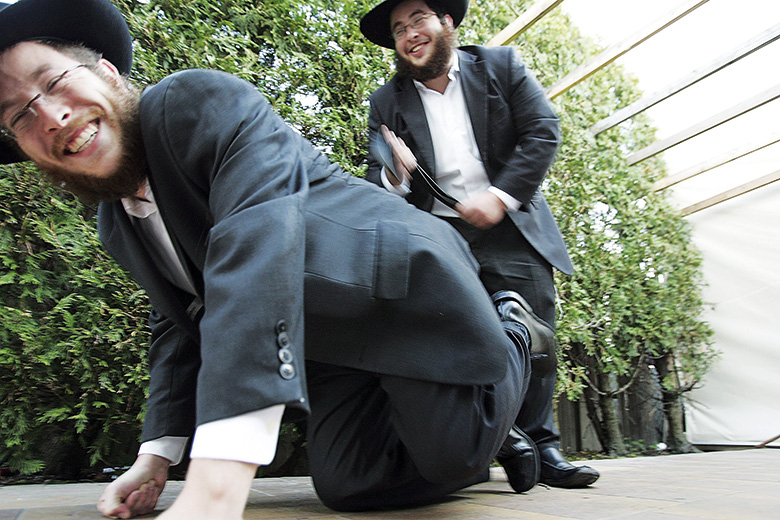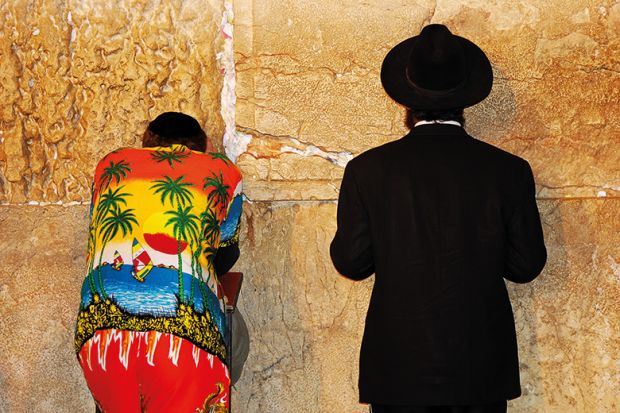Yeshiva University, the Jewish university in New York City, decided to field a crew in a rowing race. Unfortunately, they lost race after race. They practised for hours every day, but never managed to come in any better than dead last.
The chief rabbi finally decided to send Yankel to spy on the Harvard team. So Yankel went to Cambridge and hid in the bulrushes off the Charles River, from where he carefully watched the Harvard team as they practised.
Yankel finally returned to Yeshiva. “I have figured out their secret,” he announced. “They have eight guys rowing and only one guy shouting.”
This is just one of scores of Jewish jokes quoted in Devorah Baum’s breezy, accessible new meditation on how such humour works, and why it is so integral to Jewish identity.
Not that the lecturer in English literature and critical theory at the University of Southampton ever meant to write a joke book. However, when she writes proposals or gives lectures, “it turns out that jokes are one of my main sources of material”, she tells Times Higher Education. “Jokes are a kind of evidence that I marshal and use in all sorts of ways.”
Hence, when she sent a proposal to the trade publisher Profile Books, the editor responded: “I think this book should really go to an academic publisher, but why don’t you write another book about these jokes?”
The Jewish Joke: An Essay with Examples (Less Essay, More Examples), published this month, is structured around a series of questions about difference, such as “what is the difference between a tailor and a psychiatrist?” Answer: “A generation”. Another relates to the fact that Yiddish, Baum writes, “has as many terms for ‘fool’ as there are Inuit words for snow”. Shlemiel and shlimazel are two of them. So what is the difference between a shlemiel and a shlimazel? Answer: “The shlemiel is the one who slips up and spills his soup over the shlimazel”.
Other chapters explore the difference between morality and neurosis, a Jewish mother and a Jewish mother-in-law, a king and a beggar, life and death, and comedy and theology.
As for Baum’s original book proposal, that was accepted by Yale University Press, and the resulting monograph, Feeling Jewish (a Book for Just About Anyone), is also published this month, just a week before The Jewish Joke.
Baum sees both books as in essence about feelings and humour, rather than about Jewishness per se. However, she believes that the only way to approach the universal is through the particular, since “there’s a kind of lie being told if you talk about either of these things with no context, ex nihilo. One’s feelings and one’s sense of humour are always culturally rooted, so you need to focus on that first in order to understand the role that jokes play in the culture or the nature of feelings more generally.”
Another way to put this is that “our feelings tend to have a kind of history. They precede us in lots of ways. They are influenced by things beyond our control and outside us.” A number of feelings that tend to get a bad press – self-hatred, envy, guilt and paranoia – have often been associated with Jews (among others) because of “the particular position of Jews in modernity, emancipated and admitted into society, but still feeling outside as well as inside, not sure of themselves, subject to a particular kind of suspicion”.
Yet Feeling Jewish also seeks to convince us that these same feelings have become much more widespread in recent times. According to Baum, “they are increasingly what everyone is feeling in an identity-obsessed and knowledge-driven world, in which globalisation means that everyone is feeling uprooted, looking over their shoulder, not sure what tomorrow will bring.
“Paranoia is a very zeitgeisty emotion. So is guilt about not feeling quite right in the eyes of whoever one imagines is the ruling force – particularly in the online world, where there’s such an emphasis on curating your identity and knowing which club you belong to, being positive. The person behind that self-presentation is subject to these [Jewish-associated] feelings more and more.”
Some of the emotions that Baum explores are also very prevalent in the academy. She mentions, for instance, the way that “the critic is often an envious person”, with academic criticism amounting to “just an attempt to trash things, under the respectable cover of a discipline or discourse”.
In Feeling Jewish, Baum also writes about her own feelings of guilt, not only for failing to call her mother, but for “sit[ting] here ‘theorising’ in a well-heated house with a well-stocked fridge and clean running water, wearing cheaply available clothes made… I haven’t checked where or by whom, but that information is just a click of a finger away”.
The book’s central argument, which draws extensively on psychoanalysis and critical theory, is that all these uncomfortable “Jewish feelings” are not purely negative, but can also be enlivening and move us in new directions. Baum develops this case through detailed commentary on Kafka, Anne Frank, Woody Allen and Philip Roth. But she also ranges more widely, taking in Hollywood melodramas, “Truther” conspiracy theories about 9/11, academic James Lasdun’s 2013 memoir of being stalked by a student (Give Me Everything You Have: On Being Stalked) and the pressure on modern mothers to be “both suffragette and Mary Poppins”.
All of this is accompanied by some striking moments of personal revelation, such as when Baum describes her tendency for “nervous laughter”, which sometimes “loses any discernible connection to a source of amusement, and ends, invariably, in equally inexplicable tears”. This happened to her, for instance, when rereading Jane Eyre: hardly a novel known for its broad humour.

But such personal revelation is nothing compared with another of Baum’s recent projects: last year’s film, The New Man, co-directed with her husband, the film-maker Josh Appignanesi.
She had not initially meant to make a film, either. Funding seemed to be in place for Appignanesi to make a romantic comedy set in Italy. “If that falls through, I’m just filming us,” he had told Baum. She agreed “because it wasn’t going to fall through”. But, as so often in film, financing did indeed prove ultimately elusive. So, instead, Appignanesi started making a kind of home movie (or what he refers to as an auto-ethnography) about the couple’s struggle to have children.
Eventually, after fertility treatment, Baum conceived twins. However, major medical complications ensued, which ultimately resulted in the death of one of the babies in utero . Despite all the anguish of these events, Baum and Appignanesi kept the camera running – except when they forgot. “Pretty much all the quarrels you see in the film are re-enactments of quarrels we had literally just had,” Baum explains.
She also took a “front seat” in the editing of the film: “Because it had me in it, I was determined to decide what went in and what went out.” She eliminated material that was just too painful, or that she wouldn’t want the surviving twin to see: “The film is partly for him. I want him to know about his brother. I want him to know how much he was wanted and loved, but that after he was born we weren’t OK.”
The result is a highly unusual film. Despite Baum’s cuts, its contents remain so traumatic to its directors that they can no longer bear to watch it, while, even for an outsider, watching a couple exposing what seems like a marriage in meltdown makes for highly uncomfortable viewing.
But Baum also used the editing process to “remove things that were too specific to us and to include things other people could relate to”. This is what makes the film, in her view, “not just a confessional thing but a contribution to a research culture, for people who are questioning and exploring”. She hopes that it will feed into wider academic debates about “the effect of leaving pregnancy until later in life, the effect of new reproductive technologies on pregnancy. It’s equally interested in male domestic life, and in people trying to do a very old-fashioned thing – [conduct a] heterosexual marriage – in a world where it doesn’t mean what it used to.”
The New Man already has “a life as a scholarly object”, as Baum puts it, since they have screened it to MA students at the University of Oxford on a course about memoirs, to midwives at the London School of Hygiene and Tropical Medicine and to therapists at the Tavistock Institute of Human Relations, as well as to more general audiences. Baum is also thinking about submitting it to the next research excellence framework.
The death of an unborn son is by no means the only traumatic episode that Baum’s family has endured. Her relatives suffered “a terrible exposure to the worst sides of 20th-century history”. But the reason she is alive today relates to an episode from the second decade of the century that sounds like something from a black comedy: “My great-grandfather in Poland was such a shlemiel,” she explains. “He got a letter saying he was going to get a job, and he was so excited he showed it to everyone in the village – and then lost it. The person who was going to employ him was a kabbalist [mystic] and believed in signs, and said it was a sign he shouldn’t have the job.” With his employment prospects scuppered by his ineptitude, the shlemiel and his immediate family emigrated to England, thereby becoming the only members of his extended clan to escape from Central Europe before the Holocaust.
Perhaps that story is part of the explanation for why humour, often of the dark variety, has such a hold over Baum. She is fascinated, for instance, by how “comedians just can’t abide censorship and are always looking to get away with saying what you cannot say”. She also believes that a sense of humour is “a dangerous sense to lack. Comedians are super-smart: they think so fast. They have a kind of facility with language; they notice what words are doing. Certain world leaders one might mention, who seem to lack a sense of humour, just can’t understand what words are up to: they can only hear things in one way. Because they can’t hear verbal possibilities, they are limited in terms of what they can do. Humour is a critical component of a sense of justice.”
Indeed, as The Jewish Joke points out, humour has sometimes been used in response even to what most people would regard as the 20th century’s greatest injustice: the Holocaust.
For instance, Elie Wiesel, the Nobel prizewinning Holocaust survivor and novelist, “gets up to heaven [and] meets God”. “He tells God a Holocaust joke: God doesn’t laugh. Wiesel shrugs: “I guess you had to be there.”
There is much for the scholar to enjoy in Baum’s erudite but lightly sketched analysis of how humour helps us to deal with ageing, dislocation, impossible families and sexual confusion. Alternatively, you could just read it for the gags.
Devorah Baum’s The Jewish Joke: An Essay with Examples (Less Essay, More Examples) is published by Profile Books. Feeling Jewish (a Book for Just About Anyone) is published by Yale University Press.
Register to continue
Why register?
- Registration is free and only takes a moment
- Once registered, you can read 3 articles a month
- Sign up for our newsletter
Subscribe
Or subscribe for unlimited access to:
- Unlimited access to news, views, insights & reviews
- Digital editions
- Digital access to THE’s university and college rankings analysis
Already registered or a current subscriber? Login





